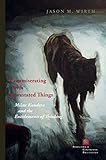Commiserating with Devastated Things : Milan Kundera and the Entitlements of Thinking / Jason M. Wirth.
Material type: TextSeries: Perspectives in Continental PhilosophyPublisher: New York, NY : Fordham University Press, [2015]Copyright date: ©2015Description: 1 online resource (256 p.)Content type:
TextSeries: Perspectives in Continental PhilosophyPublisher: New York, NY : Fordham University Press, [2015]Copyright date: ©2015Description: 1 online resource (256 p.)Content type: - 9780823268207
- 9780823268221
- 891.8/635 23
- PG5039.21.U6 Z94 2016eb
- online - DeGruyter
- Issued also in print.
| Item type | Current library | Call number | URL | Status | Notes | Barcode | |
|---|---|---|---|---|---|---|---|
 eBook
eBook
|
Biblioteca "Angelicum" Pont. Univ. S.Tommaso d'Aquino Nuvola online | online - DeGruyter (Browse shelf(Opens below)) | Online access | Not for loan (Accesso limitato) | Accesso per gli utenti autorizzati / Access for authorized users | (dgr)9780823268221 |
Browsing Biblioteca "Angelicum" Pont. Univ. S.Tommaso d'Aquino shelves, Shelving location: Nuvola online Close shelf browser (Hides shelf browser)

|

|

|

|

|

|

|
||
| online - DeGruyter Pure Act : The Uncommon Life of Robert Lax / | online - DeGruyter The Mandate of Dignity : Ronald Dworkin, Revolutionary Constitutionalism, and the Claims of Justice / | online - DeGruyter Redeemer Nation in the Interregnum : An Untimely Meditation on the American Vocation / | online - DeGruyter Commiserating with Devastated Things : Milan Kundera and the Entitlements of Thinking / | online - DeGruyter Receptive Spirit : German Idealism and the Dynamics of Cultural Transmission / | online - DeGruyter The Much-at-Once : Music, Science, Ecstasy, the Body / | online - DeGruyter Commons Democracy : Reading the Politics of Participation in the Early United States / |
Frontmatter -- Contents -- Preface -- Acknowledgments -- Abbreviations -- 1. Tamina at the Border -- 2. Caught Looking -- 3. Laughter -- 4. Dogs and History -- 5. Kitsch -- 6. Idiocy on the Verge of the Novel -- 7. Novel Idiocy -- Notes -- Bibliography -- Index -- Perspectives in Continental Philosophy
restricted access online access with authorization star
http://purl.org/coar/access_right/c_16ec
Commiserating with Devastated Things seeks to understand the place Milan Kundera calls "the universe of the novel." Working through Kundera's oeuvre as well as the continental philosophical tradition, Wirth argues that Kundera transforms-not applies-philosophical reflection within literature.Reading between Kundera's work and his self-avowed tradition, from Kafka to Hermann Broch, Wirth asks what it might mean to insist that philosophy does not have a monopoly on wisdom, that the novel has its own modes of wisdom that challenge philosophy's.
Issued also in print.
Mode of access: Internet via World Wide Web.
In English.
Description based on online resource; title from PDF title page (publisher's Web site, viewed 02. Mrz 2022)


